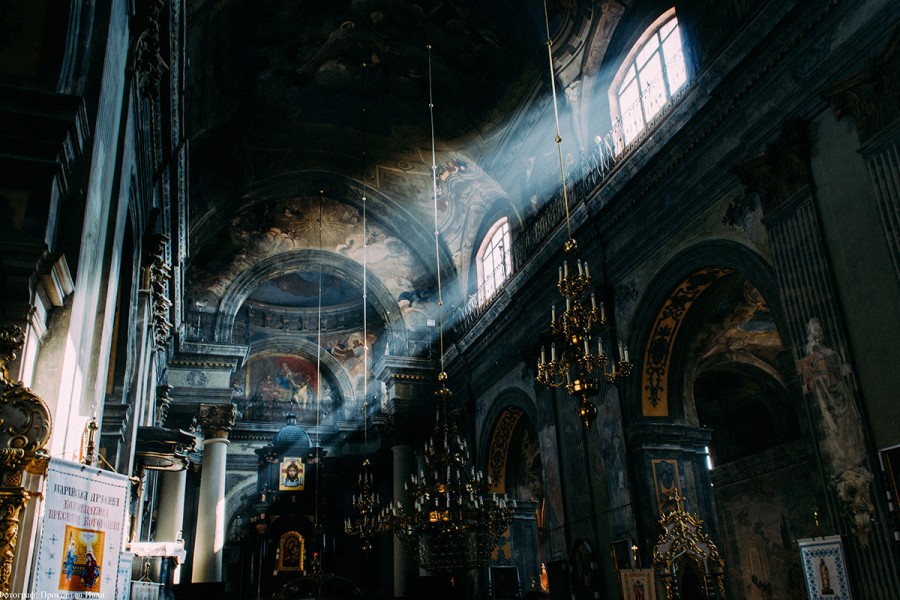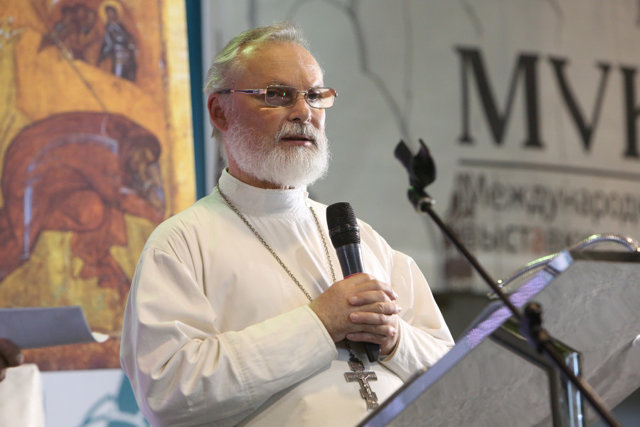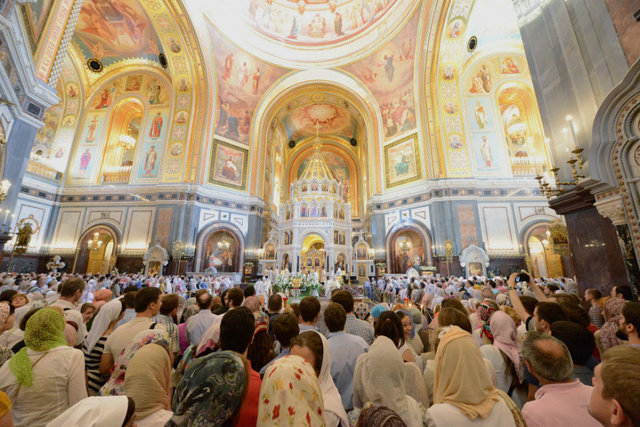Orthodoxy and Peace: “to Be, or Not to Be” Part 2. Overcoming the Schism

– What paths do you see out of this crisis?
– In the opinion of Patriarch Kirill and of several other local churches, a Pan-Orthodox council should be called to discuss this question. The Antiochian Patriarch, for instance, has called for the same thing. This would be an important step, because this question affects all the Orthodox Churches, and not just Constantinople and Moscow. It would be a very difficult council, but it could be the basis for a true manifestation of sobornost and the possibility to overcome the schism that is, at present, coming upon us. The decision of the Ecumenical Patriarch is far too one-sided, and a less than dispassionate action. When centuries and centuries stand behind huge ecclesiastical realities, it just isn’t possible to take a pen and make a simple note on the manuscript, ‘’do it differently than before.” The action of the Ecumenical Patriarch has initiated a situation that is bad for the entire Orthodox world, but all the local churches are dependent upon Constantinople, because they are frightened by the power of the Ecumenical Patriarch’s political influence. They see Constantinople as representing Orthodoxy before the whole western world and they don’t want to argue with him. For this reason, it is not likely that a Pan-Orthodox council will be successfully convened in the present situation. According to the rules, the Patriarch of Constantinople needs to call the council, but at present he has no desire to do so.
But even if there is a Pan-Orthodox council, I have a kind of intuition that nothing will be resolved there. In order to have real decisions you have to have real sobornost within the church and a deep unity of all Orthodox people. And where have you seen real unity? When it exists, it seems to be very local and doesn’t last for long.
The Orthodox churches are small and weak. They are poorly organized internally and not connected enough to each other. Many of them, and particularly the Russian church, have recently lived through terrible and frightening times. Their rebirth is still a thing of the future if it is to happen at all. In the ROC, only a portion of the churches buildings, monasteries and church structures have been restored; and, moreover, they have been restored to a fashion in which they have never before existed – with new accents in terms of both spirit and meaning. And, at times, these new accents are far from ideal.

– But is a resolution to the deepening crisis even possible inside the old “Constantine”, pyramidal life of the Orthodox church?
– No, and no! It is impossible to resolve a serious canonical crisis under an outgrown understanding of what is canonical – after all, “canonical” means “correct” and canon is law, right? But what is right from the standpoint of eternity, if you’ll excuse me, and not just because someone, somewhere at some point, ratified a rule. Even if within the church and, as they say, by the inspiration of the Spirit. After all, these things have been discerned at various times and under very particular situations – for particular times and places. All around us, we are experiencing that life has taken an entirely different turn, while the old rules remain. We have to have a new look at our entire system of canons that tell us what is right within the church and how Christians should be living at this point. We need to affirm some things as tradition, but we also have to put some things aside and develop others, transforming them in Christ for our own times. And this won’t be any sort of modernism or revisionism (obnovlenchestvo). We simple have to recognize the will of God in this. We need to search for it and act accordingly, fulfilling God’s will. And we will need an entirely different model for relationship with both society and the state; and this goes for all churches everywhere, because this is a problem absolutely everywhere in the Christian world.
We need to discern what the will of God is at this moment, at the close of the Constantine Era of church history. How now are we meant to build church? In the pre-Constantine Era, i.e. the apostolic era, 2nd century Christians manifested Church in brotherhood and community. This is a form which is entirely different from that of the modern parish, diocesan or monastic form. We need to return the Evangelical principle of our common life, and back to the experience built by the apostles and first generations of Christian brotherhoods and communities, which the church left behind under the influence of that same political expediency, due to various historical vicissitudes, exigencies and difficulties.
– This all sounds rather fantastic, because at the moment the reigns of the church are held by that very same hierarchy. How would a migration to the sort of brotherhood or community based model that you are advocating even take place? It’s unclear. Would it mean that the current form of church structure would first have to cease to exist?
– Well sometimes that happens, but I hope that won't be necessary. The thing is that there are some interesting processes going on in the church right now, and a new generation is being born – and not only in our church. A number of young priests, and even bishops, have said to me that they are dissatisfied with our current church life and await serious changes.

Not to mention lay people. But without the people, who needs all these churches, bishops and priests? We all need to be a living part of the church and not just of an ecclesial bureaucratic apparatus, structure and institution. Only the people themselves, together with the bishops and priests, are able to raise such questions and begin to resolve these issues. And people who are interested in these questions are all around, but at the moment their voices are muted. Who knows them? Who will name them? At present we only hear from people like Kuraev (Dn Andrei), Smirnov (Fr Dmitrij), Tkachyov (Fr. Andrei) or Shevkunov (Bishop Tikhon)…I could continue to list on for quite some time. This lack of diversity is a disgrace!
– Is there, in your opinion, at least a single authoritative voice which one could contrast with those in the list that you just gave?
– This is the reason that everything is muted, so that that voice won't appear within society or within the church. For us, the single formal authority is the Patriarch. But his authority is constantly being maligned straight down to the floorboards, even when he does really good things, not to mention when controversies arise, where discussion is so very needed. But we really need freedom in the church for this, and we don’t have it. All we have is a rather questionable vertical power structure. The authority of the Orthodox church within society has seriously decreased. People view the church structure as some sort of lapdog of the government, which supports the basest intentions within society: obscurantism, cheap patriotism, xenophobia, and servility vis-à-vis the authorities. The church just can’t go on living like this, and it’s obvious to everyone. This is the reason the church is paralyzed. As a certain Vladimir Iljich (Lenin) said in a by-gone era: “This is a revolutionary situation!”
– Can laypeople do anything to help resolve this “revolutionary situation”?
– They both can, and must. Priests have very little independence. As Fr Pavel Adelgeim said, priests are practically dependent upon bishops in a feudal fashion – at least as peasants before their overlords, if they aren’t out and out slaves. And among bishops, too, no one feels sufficiently independent of authority, either external or internal to the church. So it is important for lay people to act. Even if you don’t know much about theology, canon law, ecclesiology and other church traditions, if you are living a life within the church and feel for her, then something within you is hurting. Even if you don’t have the answer and don’t understand why this way and not that, or how to do things…you need to start speaking. The time for silence is well and truly over!
– And where should they speak? With friends? On Facebook?
– Wherever and whenever each of us can, but we have to try to do this without faultfinding or mudslinging. We need to pose the problems and begin to solve them, rather than telling ourselves and making a show to others that “if this is church, then it is called to be the mystical Body of Christ, therefore all our problems are really already solved”…or that they shouldn’t be visible to society around us and the rest of the world. Nothing of the sort – the problems are all too obvious.
The Church is made up of people, and where there are people, there are problems. In God there are no problems, but with people the problems are always there. When all this is hidden away, it only makes things much worse, because when people see things that shouldn’t be there in the church, they begin to fantasize, and suspect the worst of everyone. Having seen something unpleasant in one place, people begin to believe it’s the same everywhere. People don’t trust the church because they see that there is no openness in the church. In addition, there is the paradox which has always in all times persisted: there will always be forces in this world that fight against the church, as such, and the better the church is, the greater these forces will be.
– And in terms of the internal life of the Russian Orthodox Church, does this schism carry with it particular threats? Or maybe on the contrary? Can it be a stimulus for the creation of unity and the consolidation of various Orthodox groups, forces and traditions?
– This crisis has brought problems, but it is also “pregnant” with good things. But good never just manifests in and of itself, without our help. If you want good things, if you want to correct mistakes and sins, this requires repentance and common and consolidated creative, spiritual and sorbonal (conciliar) effort. Create what it is that you want, that God wants from you – the things that you are positioned to create. Do you want to live in a spirit of love and freedom in Christ? Do you want to live in a spirit of brotherhood, fellowship and service? Then act, starting from yourself. This is the most important thing. Yes, we are called to repent of a lot, and of our own past, itself. Yes, our whole nation, country and church needs to be reborn. And the church needs this. And we don’t need to be shy or afraid to speak about this, even though many people, of course, will try to reign in those who want to speak seriously about these things. But this has always been the case. Sometimes in a more civilized fashion and sometimes less gracefully. We have to stand against this with the force of our common faith, hope and love.
The 1990s are gone – those years in which everything that the church had to offer was received in joy – those years in which even the ugly was interpreted in rainbow colours and received through rose-coloured glasses. And now we have come to an era of real crisis, and there is no way in any case that it is going to pass quickly. Even if in some way we can, at this point, reconcile the Second and Third Romes. [Translator’s note: Constantinople is understood to be the Second Rome, and Moscow the Third Rome, from the standpoint of Russian orthodox tradition.] The problems have penetrated significantly deeper and farther than all this, and even some sort of reconciliation between church structures will not solve our current issues; it can only slightly soften the path to real resolution.
– What are the primary things that we haven’t tended to healing in the aftermath of Soviet repression, and what is it that we mustn’t miss at this point, if we truly desire healing in the present crisis?
– Well, we slept through a real possibility for church revival at the beginning of the 1990s. We didn’t do anything. We just sat there thinking about ourselves and our own things: where can we get money, how can we restore our former level of luxury and former influence upon the state, the nation and the culture – on anything at all. We busied ourselves with all the wrong things. We shouldn’t have put all our resources into the restoration of churches, monasteries, and other church property. If the government had wanted to restore these buildings then this would have happened at the government’s initiative and on its own budget. We could have helped them, but it was entirely unnecessary to jump into the straightjacket and, as a result, become entirely dependent upon the posture of the state – a situation which continues until this day.
We should have immediately understood that the church’s main affair is the restoration of human souls. In all times and in all places. We should have been busy with people, as were the Transfiguration Brotherhood and St. Philaret’s Orthodox Christian Institute, for instance. And this is still the most important thing that we in the church should be busy with. This is our centre.

And this is more important than what is going on in Kiev, or in Constantinople, or in the Moscow Patriarchate. But instead of helping people to acquire faith and come into the church, we used their illiteracy and spiritual desolation, provoked them to reaction against the use of Russian language in church services – without which modern people had no hope of understanding liturgy, or Holy Scripture or church tradition. Rather than working for the restoration of normal human fellowship and brotherly relations within the church, we provided parishes that were structured in such a way as to make normal orthodox life according to the gospel nearly impossible. And we pronounced the most vulgar and despotic clericalism to be the only possible form and rule of church life, almost as if it had been established by the apostles themselves.
As a result of all this, laypeople were almost left entirely out of the canonical picture altogether, and priests became as peasants, while the landowners, drunk on their own lack of responsibility before the church and God, behave in any way they want, as there is no managing authority over them. It is such a shame that there isn’t really a connection between the Patriarch and the people or the bishops and the people. But this connection will be restored if the hierarchs begin to have a measure of humility, and begin to remember that they are servants. As Metropolitan Anthony of Sourozh said in quoting Fr. Safrony (Sakharov), the bishop should be at the top of the pyramid, but the pyramid should be upside down. The highest of all responsibility and the greatest of all weights lies with the bishop, because he bears the most serious ministry; but at the same time he has fewer privileges and less power than anyone. But power, and especially spiritual power, corrupts and perverts people. And as long as history continues, this will be the case. And for this reason power should be only God’s and of God – the power of love, and that is all! Everything else a bishop has could be termed spiritual authority, or something like that.
We could have and should have done all this in the 1990s. Now, after the passage of almost 30 years, everything is harder. At this point, considerably more effort, time and resources will be required. And although we are perfectly well aware of all the wounds our Patriarchate bears, nevertheless our Russian Orthodox Church isn’t just the Patriarchate, and isn’t even so much the Patriarchate. There are many wonderful and holy people in the Russian church. For instance, Fr. Vitaly Borovoj; although he worked in the Patriarchate, he was a bright and even a holy man. Of course, it’s hard to find people like him these days, but I do hope it is possible. If we clear the road for them, they will come out of the woodwork. Thus, the Patriarchate is the Patriarchate, but the Russian Orthodox Church is a church – and we shouldn’t confuse these two things. We need rebirth in the church, rather than the reconstruction of a new patriarchate. We need, too, to understand this.
* Constantine paradigm – an understanding of the relationship between church and state as symphony, one completing the other. The Constantine paradigm was formed during the Constantine Era of church history, from the mid 4th to early 20th century, which is named for the first Christian emperor, Constantine the Great (approx.. 272-337), after whose time Christianity became the state religion of the Roman Empire. As the church grew in numbers and became more centralized and unified in terms of structure, the Constantine Era came to be characterized by a blurriness in understanding relating to church membership and by a shift in emphasis in the direction of ritual and cult, which is uncharacteristic for Christianity.
